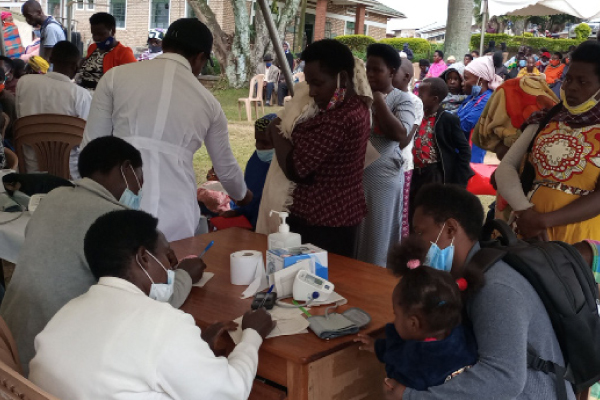Doctors worry over rising cases of lifestyle diseases in villages

Residents during the medical camp at Ishaka Adventist Hospital in Bushenyi District on Tuesday. PHOTO/ZADOCK AMANYISA
What you need to know:
- In 2014, the national STEPwise survey in Uganda revealed that 24.3 percent of Ugandans had elevated blood pressure while the country’s pre-hypertension rate was at 37 percent. According to the survey data, 70 percent of the respondents had never had their blood pressure measured and 76 percent of those with raised blood pressure were untreated
Medical workers have expressed concern over the rising cases of non-communicable diseases, also known as lifestyle diseases, in rural communities.
The doctors say initially, such ailments, which include diabetes, heart diseases, cancer, chronic kidney disease and osteoarthritis are associated with people living in urban areas.
But medical doctors were surprised that 60 per cent of about 2,000 people who turned for a medical camp in Bushenyi District on Monday and Tuesday were diagnosed with heart diseases, hypertension (high blood pressure) and diabetes.
The free medical camp attracted residents from the districts of Bushenyi, Mitooma, Rubirizi, Sheema and Buhweju. It was organised by Ishaka Adventist Hospital in collaboration with Mr Dick Noble, an American social worker, and Bushenyi District local government.
Findings
“Observations from nine clinicians in the camp indicate that most people are suffering from diabetes, hypertension and heart diseases, something that seems abnormal. Previously, we have had people diagnosed with infections such as malaria, urinary tract infections, flu and cough,” Dr Paul Ssempebwa, a medical doctor at Ishaka Adventist Hospital, told Daily Monitor.
The main factors contributing to lifestyle diseases include bad food habits, physical inactivity, wrong body posture, and disturbed biological clock.
While people living in urban centres have previously been vulnerable to non-communicable disease because of spending much of the time in one place and not minding exercising, their counterparts in the rural areas get non-communicable diseases due to poverty-related stress, according to Dr Eliab Tayebwa, the Bushenyi District health officer.
“Yes, people in rural areas do a lot of work because they dig, weed and do all sorts of movements, but many of them remain stressed and stress management is their problem. Someone spends the whole day working, but has no money for taking care of the family. Such people normally get stressed and suffer from lifestyle diseases. Some end up getting mental health problems and committing suicide,” Dr Tayebwa said.
Ms Zaharat Nabadda, a nurse, added that rural-based people have poor eating habits, hardly exercise, and handle stress poorly.
“No insect causes lifestyle diseases like diabetes. It is basically how you are managing and behaving. What you eat and how it affects you brings in conditions such as high blood pressure, arthritis and diabetes. We have also realised that many people don’t exercise because they don’t have time. Others don’t see it important, others say they are busy. So, Inactivity, especially in the rural areas where people think they have everything near them, is becoming a problem,” she argued.
Advice
The head of nursing at Ishaka Adventist Hospital, Ms Hope Rukundo advised people to always go for medical check-up to help them in monitoring their health.
The Ishaka Adventist Hospital executive director, Ms Lydia Komugisha, said the medical camp was missionary work extended to the people who cannot access affordable medical services.





